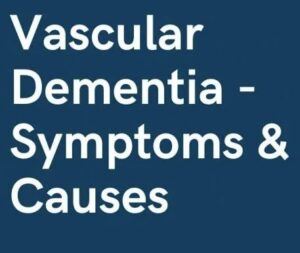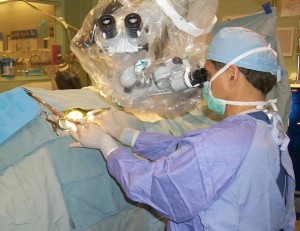The Second Most Common Cause of Dementia – Vascular Dementia
 January 2024 The fear of dementia as we age is both real and justified. With the US population age 65 and older growing, so too are the number and proportion of Americans with Alzheimer’s or other dementias. By 2050, the number of people age 65 and older with Alzheimer’s dementia is expected to nearly double from about 6.8 million to 12.7 million. The most common forms of progressive dementia include Alzheimer’s disease, vascular dementia, frontotemporal dementia, and Lewy body dementia.
January 2024 The fear of dementia as we age is both real and justified. With the US population age 65 and older growing, so too are the number and proportion of Americans with Alzheimer’s or other dementias. By 2050, the number of people age 65 and older with Alzheimer’s dementia is expected to nearly double from about 6.8 million to 12.7 million. The most common forms of progressive dementia include Alzheimer’s disease, vascular dementia, frontotemporal dementia, and Lewy body dementia.
Vascular dementia is the second most frequent type of dementia after Alzheimer’s disease. It makes up at least 20% of all dementia cases. Vascular dementia can happen on its own or alongside other types of memory problems or types of dementia. Vascular dementia (VD) is caused by damage to the brain’s blood vessels. Conditions that decrease blood circulation, like vascular narrowing, or a stroke blocking an artery, may cause damage to the brain from impaired blood flow. Risk factors are those that increase a person’s risk of stroke and vascular diseases, called atherosclerosis. Other VD risks include, diabetes, hypertension, high cholesterol, and smoking, which constricts blood vessels and blood flow.
Common symptoms of VD include memory loss, slowed thinking, and loss of interest in things or people they previously enjoyed. It is common for people with VD to experience behavioral changes, such as irritability, that make them choose to be isolated. Symptoms may develop gradually or may progress after a series of small strokes.
Early signs and symptoms of vascular dementia include:
- Having a challenging time with familiar tasks that used to be easy
- Getting lost on routes that are usually familiar, like to the grocery store or to work
- Having trouble with language, like finding the right words for common objects
- Losing interest in activities you used to enjoy
- Feeling less emotional
- Misplacing things often
- Changes in personality, social skills, and behavior
As dementia worsens, symptoms may include:
- Change in sleep patterns
- Difficulty doing basic tasks
- Forgetting details about current events
- Having delusions, depression, or agitation
- Having hallucinations, arguments, striking out, or violent behavior
- Having poor judgment and loss of ability to recognize danger
- Withdrawing from social contact
Diagnosing Vascular Dementia
Typically neurologist will determine the diagnosis by discussing the person’s ability to do everyday tasks, performing tests to check memory and cognitive skills, and to talk to someone close to the person to understand if there are signs of dementia. Blood tests are also done along with a MRI the can examine the blood vessels and assess for blood brain flow and vascular narrowing. It can be difficult to diagnosing vascular dementia accurately since in can also exist along with other dementias, like Alzheimer’s disease, which is the most common cause of dementia.
Treatment and Prevention
Unlike Alzheimer’s disease, Vascular dementia does not involve abnormal proteins, called amyloid plaques, that cause disruption of brain function. And therefore the latest FDA approved drugs that target these plaques are of no benefit for Vascular dementia. Medications used for VD primarily focus on improving vascular flow to the brain in order to preserve the brain tissue still functioning.
Prevention of VD is considered the best approach for all types of dementia. Numerous studies have shown for both Vascular dementia and Alzheimer’s dementia (non-family genetic type) that lifestyle modifications can reduce the risk of developing dementia as we age. According to the NIH publication from 2020, there are 4 or 5-major modifications that have the greatest risk reduction benefits for dementia.
A study that included data from nearly 3,000 research participants showed those who adhered to four or all of the five specified healthy behaviors and were later found to have a 60% lower risk of Alzheimer’s. The behaviors were physical activity, not smoking, not exceed light-to-moderate alcohol consumption, a high-quality diet, and enhanced cognitive activities.
Details of Lifestyle Changes the had the Greatest Benefits:
- Exercise – At least 150 minutes per week of moderate- to vigorous-intensity physical activity
- Not smoking – Established research has confirmed that even in people 60 or older who have been smoking for decades, quitting will improve health.
- Light-to-moderate alcohol consumption – Limiting use of alcohol may help cognitive health.
- A high-quality, Mediterranean-DASH Intervention for Neurodegenerative Delay (MIND) diet, which combines the Mediterranean diet and Dietary Approaches to Stop Hypertension (DASH) diet – The MIND diet focuses on plant-based foods linked to dementia prevention.
- Engagement in late-life cognitive activities – Being intellectually engaged by keeping the mind active may benefit the brain.
Like Alzheimer’s, Vascular dementia is a scary and unwelcome quest of aging that most of us have a choice to try to avoid. Start on a path to dementia risk reduction and your future self will thank you.
REF- https://medlineplus.gov/ency/article/000746.htm
https://medlineplus.gov/ency/article/000746.htm
https://www.nih.gov/news-events/news-releases/combination-healthy-lifestyle-traits-may-substantially-reduce-alzheimers




 Dr. Maroon received an athletic scholarship to Indiana University in Bloomington, Indiana where as an undergraduate, he was named a Scholastic All-American in football. Dr. Maroon has successfully maintained his personal athletic interests through participation in 9 marathons and more than 72 Olympic-distance triathlon events. However, his greatest athletic accomplishment is his participation in 8 Ironman triathlons (Hawaii – 1993, 2003, 2008, 2010, 2013; Canada – 1995; New Zealand – 1997; Germany – 2000), where he usually finishes in the top 10 of his age group. Recently, in July 2012 and 2013, he finished second and third, respectively, in his age group in the Muncie, Indiana half Ironman triathlon. In October 2013 he completed his 5th World Championship Ironman in Kona, Hawaii.
Dr. Maroon received an athletic scholarship to Indiana University in Bloomington, Indiana where as an undergraduate, he was named a Scholastic All-American in football. Dr. Maroon has successfully maintained his personal athletic interests through participation in 9 marathons and more than 72 Olympic-distance triathlon events. However, his greatest athletic accomplishment is his participation in 8 Ironman triathlons (Hawaii – 1993, 2003, 2008, 2010, 2013; Canada – 1995; New Zealand – 1997; Germany – 2000), where he usually finishes in the top 10 of his age group. Recently, in July 2012 and 2013, he finished second and third, respectively, in his age group in the Muncie, Indiana half Ironman triathlon. In October 2013 he completed his 5th World Championship Ironman in Kona, Hawaii.